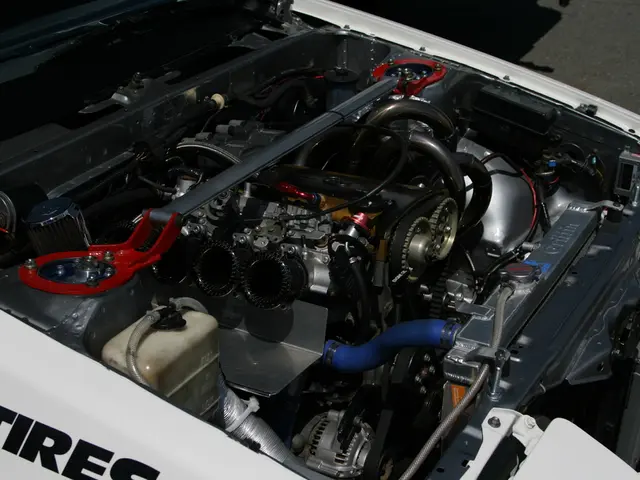Competition between Intel and AMD: What gaming laptop CPU should one choose in 2025?
In 2025, the battle for laptop gaming dominance heats up as Intel and AMD duke it out with their top-tier CPUs, promising desktop-quality gaming experiences on the go. If you're a serious gamer, choosing the right CPU can make or break your gaming experience. While GPU specifications often catch the limelight during laptop shopping, it's the processor – the unsung hero – that truly sets the stage for smooth gaming, efficient multitasking, and future-proofing your investment. Here's a run-down of Intel and AMD's latest offerings to help you make an informed decision:
Why CPU power matters for gaming:
With their fingers on the pulse of the gaming industry, Intel and AMD have been pushing boundaries to create the ultimate mobile gaming processors. The CPU acts as the central nervous system of your gaming laptop, handling complex physics calculations, artificial intelligence routines, and critical gaming operations.
Today's games demand more from CPUs, especially demanding titles like open-world games and simulation games that require superior single-core performance and high cache sizes for swift data retrieval during gameplay.
Intel's Core Ultra Series 2:
At CES 2025, Intel unveiled its Core Ultra Series 2, featuring its most advanced mobile gaming architecture yet. The flagship Intel Core Ultra 200HX series boasts an innovative hybrid architecture, seamlessly blending high-performance cores and efficient cores for optimal gaming experiences.
The Intel Core Ultra 9 275HX stands as the star in Intel's mobile gaming lineup, sporting up to 24 cores (8 performance cores and 16 efficiency cores). This architecture grants the processor impressive single-core gaming performance, while effectively managing background tasks. The processor can reach boost clocks of up to 5.4 GHz, ensuring responsive gameplay even in CPU-intensive titles.
Intel upped its integrated graphics game with the Intel Arc technology, equipped with up to eight Xe cores and Intel Xe Matrix Extensions for AI acceleration. The Core Ultra 200H series outperforms its predecessors by up to 22% according to Intel's internal benchmarks, particularly in competitive esports titles.
Another exciting addition to Intel's gaming-focused chips is a Neural Processing Unit (NPU) capable of 13 trillion operations per second (TOPS). This NPU can accelerate specific AI enhanced gaming features without overwhelming the main processing cores.
Intel also prioritized connectivity, providing as many as 48 total PCIe lanes for high-speed storage and expansion options that serious gamers desire. The latest mobile platform also supports PCIe 5.0 and WiFi 7, ensuring future-proofing for upcoming peripherals and networking standards.
AMD Ryzen 9000 Series:
The Ryzen 9 9955HX sits atop AMD's gaming throne, featuring 16 cores based on the advanced Zen 4 architecture. What sets AMD apart is its 3D V Cache technology, available in chips like the Ryzen 9 9955HX3D. This technology pillboxes additional cache memory on top of the processor, significantly expanding the L3 cache for improved gaming performance.
In terms of raw specifications, the standard Ryzen 9 9955HX offers 5.4 GHz boost clocks, 16MB of L2 cache, and 64MB of L3 cache. AMD's mobile chips excel in modern AAA titles like Elden Ring, Starfield, and Hogwarts Legacy, where the extra cache provides measurable frame rate advantages.
The Ryzen 9000 series supports PCIe 5.0 for high-speed storage and connectivity, and DDR5 memory, catering to the needs of memory-intensive gamers, content creators, or streamers.
Power consumption, thermal headroom, and battery life:
When choosing a gaming laptop, power efficiency is key. AMD has made enormous strides in power efficiency with its 5nm manufacturing process, delivering exceptional performance per watt. This results in more consistent performance during extended gaming sessions, as well as quieter operation.
In contrast, Intel's Core Ultra processors typically consume more power under full load, with the increased demand taxing the cooling system and shortening battery life. However, Intel has improved thermal characteristics with its latest generation, reducing the impact on battery life in some cases.
Wrap-up:
Ultimately, both Intel and AMD present exceptional mobile gaming processors catering to different preferences. For competitive gamers who prioritize single-core performance and AI-capabilities, Intel's Core Ultra series might be the way to go. But for those who seek a balance between gaming prowess, power efficiency, and multitasking performance, AMD's Ryzen 9000 series looks like a solid choice. By understanding your unique gaming needs and preferences, you can make an informed decision that suits your lifestyle and budget.
- For gamers seeking a balance between gaming performance, power efficiency, and multitasking, the AMD Ryzen 9000 series could be a preferred choice, thanks to its advanced Zen 4 architecture and 3D V Cache technology.
- To enhance the mobile gaming experience, aspirants can look into laptops equipped with Intel's Core Ultra 200HX series, which includes high-performance CPUs like the Core Ultra 9 275HX, with up to 24 cores, 5.4 GHz boost clocks, and Intel Arc technology for improved graphics and AI acceleration.







